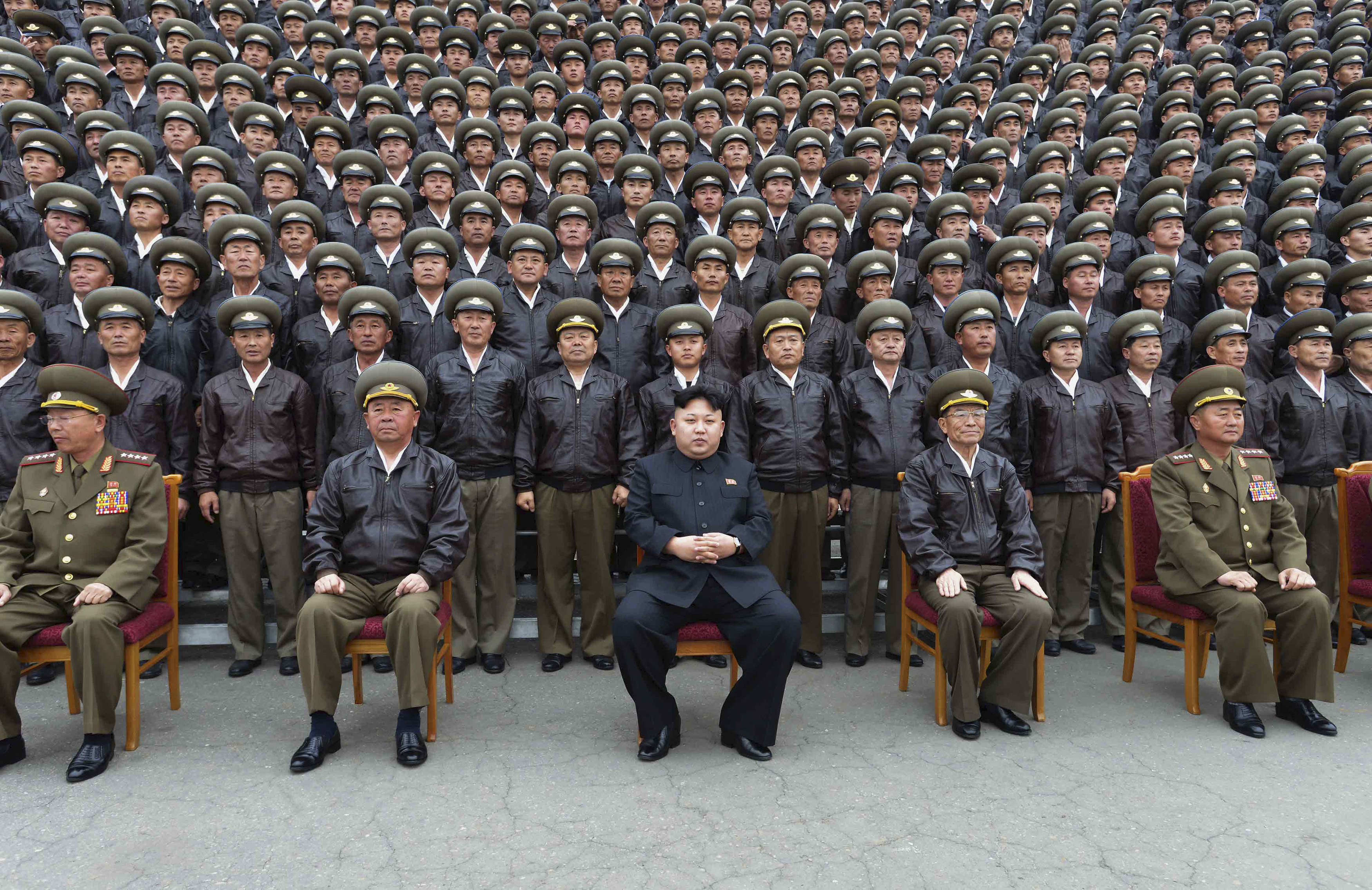Why the sudden collapse of North Korea would be hell on Earth
The real North Korea problem isn't nukes. It's the quick death of the Kim regime.


A free daily email with the biggest news stories of the day – and the best features from TheWeek.com
You are now subscribed
Your newsletter sign-up was successful
There is no nation on the planet more dangerous than North Korea — and that's putting it charitably.
The leader of the so-called "hermit kingdom," Kim Jong Un, is the master of his own personal hell six decades in the making. It includes labor camps described by a North Korean defector as worse than Auschwitz and a population, brainwashed into thinking the Kim family is a god, with no hope for a brighter future or any chance of freedom.
To make matters even worse, Kim is now armed with nuclear weapons that most experts think can hit not only South Korea and Japan, but in the next few years, the U.S. homeland. By 2020, some scholars believe North Korea could have enough atomic material for 100 nuclear bombs.
The Week
Escape your echo chamber. Get the facts behind the news, plus analysis from multiple perspectives.

Sign up for The Week's Free Newsletters
From our morning news briefing to a weekly Good News Newsletter, get the best of The Week delivered directly to your inbox.
From our morning news briefing to a weekly Good News Newsletter, get the best of The Week delivered directly to your inbox.
But in all fairness, there is one event possibly even more perilous than Pyongyang showing itself capable of launching a nuclear attack on Asia or America. Oddly enough, it is something many experts over the last few weeks have been rooting for — the collapse of North Korea's government.
On the surface, the downfall of Pyongyang would seem like an unquestionable good thing, the death of a totalitarian state that should have long ago been tossed into the dustbin of history. However, just a quick walkthrough of what could happen in an uncontrolled collapse sends shivers down the spine of anyone who has studied the subject in detail — a topic that has been grossly underexamined in popular media considering the stakes.
While a full review of the possible ways the North Korean state could meet its end is worthy of its own separate treatment, the dangers after a sudden collapse are quite clear.
For our purposes, let us assume an internal event has caused the Kim family dynasty to come to a quick death. There is no central government and allied forces comprised of South Korea and the United States are moving across the 38th parallel to ensure order. What could be so bad?
A free daily email with the biggest news stories of the day – and the best features from TheWeek.com
Well, for starters, there would be immediate concern over who has control over not only of Pyongyang's nuclear and atomic materials, but its perhaps much larger chemical and biological weapons stockpiles as well.
While sometimes an afterthought, North Korea's chemical and biological weapons might be a much a bigger threat than its nuclear program. Most research points to Pyongyang having large quantities of chemical weapons — on display recently in the apparent assassination of Kim Jong Nam, the half-brother of Kim Jong Un — as well as a biological weapons programs capable of killing millions. U.S. and allied forces would surely need to mount an unprecedented intelligence effort to not only locate almost all of these materials but protect themselves from chemical or biological weapon attacks by forces who could be still vying for power. Allied forces would also need to ensure that no weapons of mass destruction left the country — a non-proliferation nightmare of the worst kind.
As if potential loose weapons of mass destruction were not enough, there is an even more basic problem — that of a shattered society. How does one put back together a people broken by almost seven decades of being ruled as if they were slaves? How will the average North Korean, who only knows the Kim family, react to the end of the regime? Would some take up arms against those who would be there to ensure order? Is civil war a possibility? One thing is quite clear: It could take decades, but more likely generations, to wipe away the scars of psychological, emotional, and surely spiritual torture that was suffered.
Then there is China. Beijing would obviously be a player in any future of North Korea, especially as its largest trading partner, providing Pyongyang with much of its food and energy needs. In fact, many national security experts in China are quick to point out that the Chinese Communist Party's greatest international worry is the collapse of the North Korean state. They fear a united Korea would become a major player in Northeast Asia, allied with America and armed with Washington's best weapons and troops. And if millions of refugees started coming across the border into China, President Xi Jinping might send his own forces into North Korea — where a superpower showdown between Washington and Beijing could be in the offing.
And last, the sheer cost of rebuilding and reintegrating the North back into a united Korea would likely be in the trillions of dollars. Who would pay such costs? While South Korea is certainly an economic powerhouse, rebuilding and integrating North Korea into the south would be a historic undertaking — far greater than the merger of East and West Germany after the end of the Cold War.
Back in 2013, a defector described North Korea as a "gulag masquerading as a country" — perhaps the perfect description for the most imperfect of regimes. But while the people of North Korea clearly deserve better, free of what can only be described as the vilest forms of state-sanctioned terror ever devised, a spontaneous, uncontrolled collapse could cost millions of people their lives. All the more reason for the Trump administration to act cautiously in the months to come.
Harry J. Kazianis is director of defense studies at the Center for the National Interest, founded by former U.S. President Richard M. Nixon.
-
 How the FCC’s ‘equal time’ rule works
How the FCC’s ‘equal time’ rule worksIn the Spotlight The law is at the heart of the Colbert-CBS conflict
-
 What is the endgame in the DHS shutdown?
What is the endgame in the DHS shutdown?Today’s Big Question Democrats want to rein in ICE’s immigration crackdown
-
 ‘Poor time management isn’t just an inconvenience’
‘Poor time management isn’t just an inconvenience’Instant Opinion Opinion, comment and editorials of the day
-
 Epstein files topple law CEO, roil UK government
Epstein files topple law CEO, roil UK governmentSpeed Read Peter Mandelson, Britain’s former ambassador to the US, is caught up in the scandal
-
 Iran and US prepare to meet after skirmishes
Iran and US prepare to meet after skirmishesSpeed Read The incident comes amid heightened tensions in the Middle East
-
 Israel retrieves final hostage’s body from Gaza
Israel retrieves final hostage’s body from GazaSpeed Read The 24-year-old police officer was killed during the initial Hamas attack
-
 China’s Xi targets top general in growing purge
China’s Xi targets top general in growing purgeSpeed Read Zhang Youxia is being investigated over ‘grave violations’ of the law
-
 Panama and Canada are negotiating over a crucial copper mine
Panama and Canada are negotiating over a crucial copper mineIn the Spotlight Panama is set to make a final decision on the mine this summer
-
 Why Greenland’s natural resources are nearly impossible to mine
Why Greenland’s natural resources are nearly impossible to mineThe Explainer The country’s natural landscape makes the task extremely difficult
-
 Iran cuts internet as protests escalate
Iran cuts internet as protests escalateSpeed Reada Government buildings across the country have been set on fire
-
 US nabs ‘shadow’ tanker claimed by Russia
US nabs ‘shadow’ tanker claimed by RussiaSpeed Read The ship was one of two vessels seized by the US military
